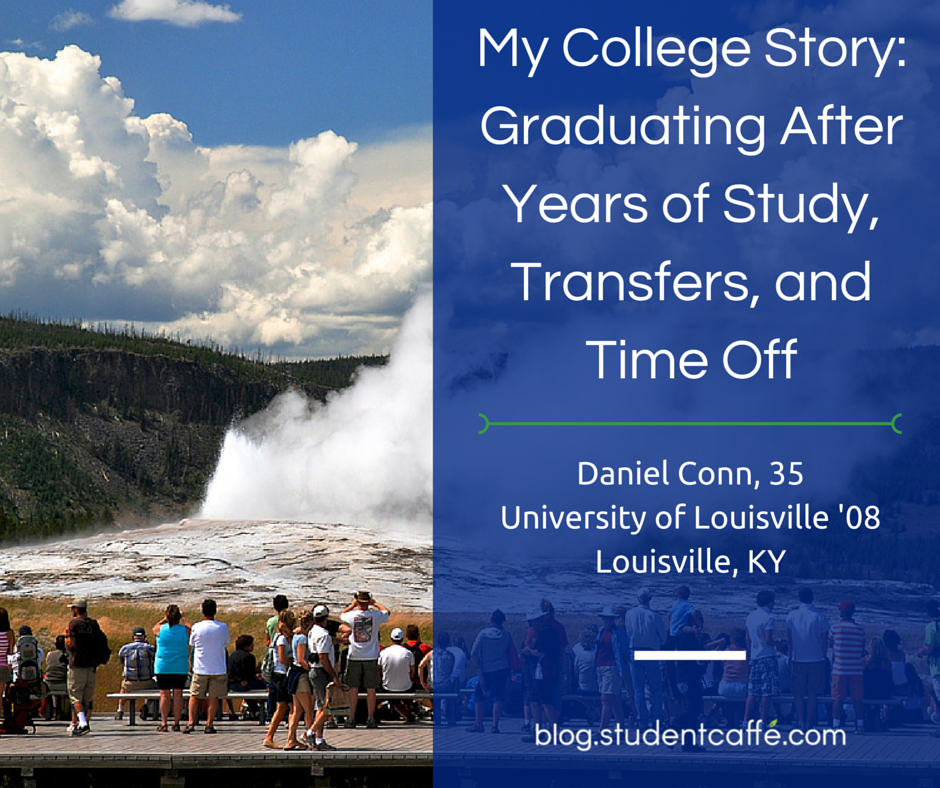
Daniel Conn
Before receiving his bachelor’s degree, Daniel Conn attended four colleges and took time away from school to work in Yellowstone National Park. He completed his core requirements at a community college while working full-time to make his education affordable. His time in Yellowstone gave him the opportunity to explore his passion for environmental education while building his résumé. During this period of individual study, Daniel narrowed his interests into a focused career path. When he decided to return to college, he pursued a unique degree needed to work in his desired field, Geographic Information Systems (GIS). He is now employed as a GIS analyst.
Q. What is your current job, and how did your college education prepare you for your work?
In my professional career of eight years, I have had only one title: GIS analyst. I analyze cultural and natural resource data for an environmental engineering firm. I finished my geography undergraduate degree focusing on Geographic Information Systems (GIS) and was fortunate enough to obtain credit hours for completing an internship as a GIS analyst with my local government.
Q. How many schools did you attend before receiving your undergraduate degree?
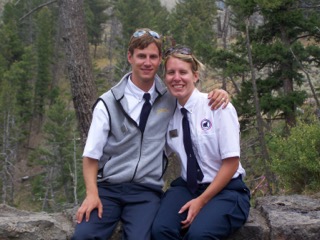
Daniel and his wife during his time in Yellowstone as a tour guide (Daniel Conn)
I attended four schools before I obtained my undergraduate degree. I began in the fall of 1999 and finished in spring of 2008.
Q. What motivated you to transfer?
I was always in search of a balance between quality education and a fair tuition price. I began thinking that an undergraduate degree was just a piece of paper and sought out the least expensive state school. I transferred to a part-time community college to complete my core requirements and began working full-time. Again I transferred to join a uniquely focused program in education while working full-time. I then took a break from school to pursue my passion as a naturalist (I went to work for Yellowstone National Park), then finished my degree after aligning with a pursuable career path.
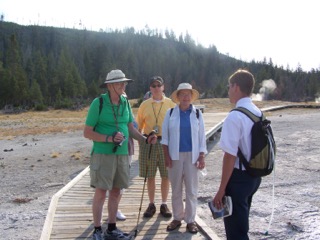
Giving a tour of Yellowstone National Park (Daniel Conn)
Q. Was it difficult to transfer credits from one school to the next?
It was surprising how many credits that I lost from taking electives during my first four semesters of workload. My previous major’s requirements turned into electives for my final major. Only so many electives could be counted toward my degree.
Q. What advice would you give to students considering a transfer?
Students considering a transfer should accept the risk that they could lose credits or could need to supplement courses to fulfill new requirements.
Q. Why did you decide to take time off from school to work in Yellowstone National Park?
My passion in pursuing a formal degree in education early in my postsecondary pursuit was always coincident with the environmental education side of the discipline. I had an opportunity to work in Yellowstone Park as a naturalist and practice informal education (teach outside of a classroom) to people of all ages. I used the opportunity to refine the elements of my passion into what could be morphed into a career.
Yellowstone Park is a special place where the philosophies of the state of nature in the world can be tested through science and human culture. It provided me with a blank canvas to pursue intellectual life outside of an academic setting, which ended up fostering an environment where I am comfortable as a consultant scientist/engineer for hire.
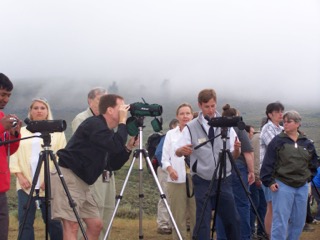
Daniel when he was working as a tour guide in Yellowstone National Park (Daniel Conn)
Q. In your opinion, what type of student would benefit from taking a break from school?
I am a proponent of individual creative study; it is how I learn best. In my opinion, students who trust their own authority on their educational needs should pursue their growth and education along whatever lines they deem appropriate. Taking your time to focus on the career path that you deserve can be very rewarding, but the range of opportunities might diminish if you obtain a degree without much focus as an older nontraditional student.
Q. For you, what does it mean to have a college degree?
As a first-generation college student, I was wrought with conflict about the value of a degree. After I obtained my degree, there was no question how valuable the degree was, monetarily in earning potential and also in self-worth and confidence.
Q. Do you believe that self-education is just as important as classroom education?
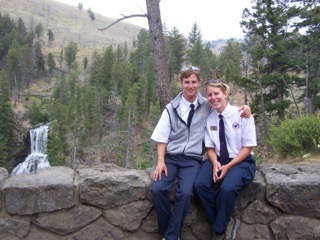
Daniel and his wife in Yellowstone National Park (Daniel Conn)
I believe that self-education can give you a fulfilling creative and intellectual personal life. I do not believe statistically that one can expect the same fulfillment in a job without the proper classroom education. I believe that classroom education is more difficult and more important than self-education.
Q. You have two young daughters, ages three and six. They are a long way from college, but what advice will you give to them as they prepare for life after high school?
Life is more complicated than a bumper sticker, but sometimes a kernel of knowledge can inspire a lifetime of learning. I’d like to think that I will be able to tell them with confidence to “learn from others, but go to your own school.”
-
My College Story: Switching Schools, Majors, and Careers
-
My College Story: Living and Teaching English in Chile
-
My College Story: Student and CEO
-
My College Story: Ending Up Exactly Where I Need to Be
-
My College Story: Attending a Women’s College
-
My College Story: Moving to a Snowy Climate for College
-
My College Story: From Small Town to Big Campus
-
My College Story: Learning to Live with PMDD
-
My College Story: The True Value of Education
-
My College Story: Why I Suggest a Gap Year
-
My College Story: Handling a Tragedy during the Semester
-
My College Story: Life in the Service

